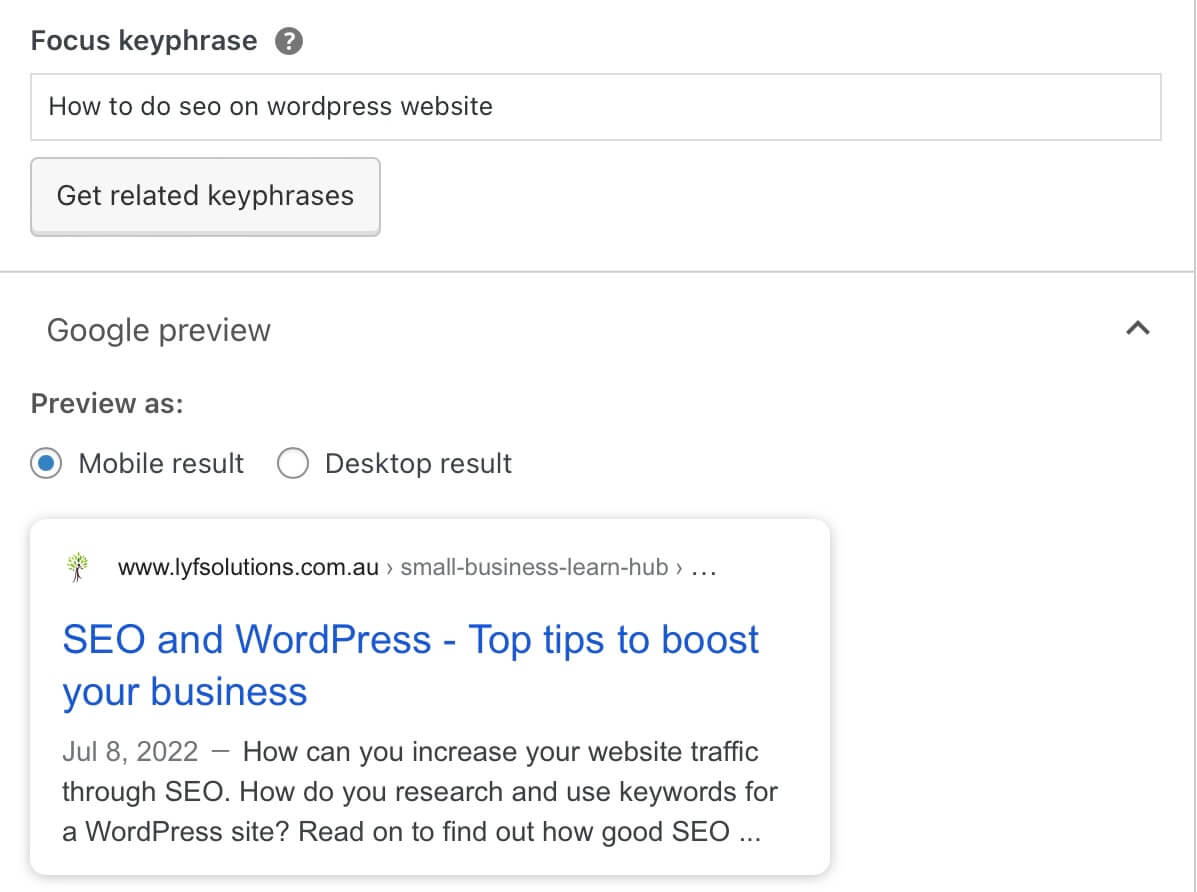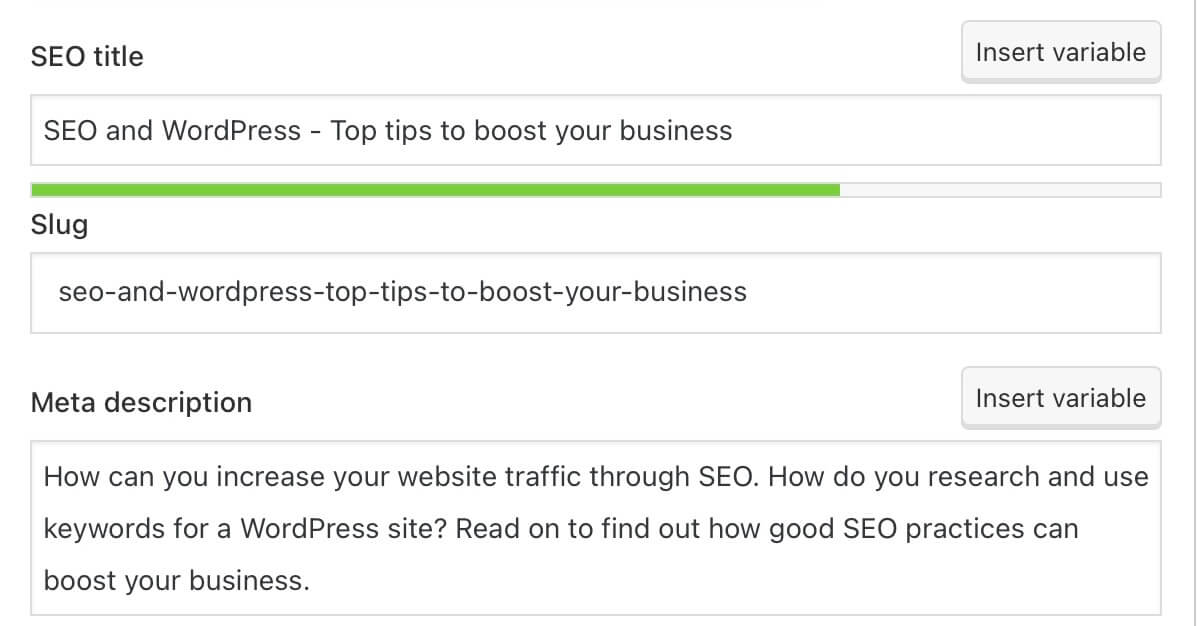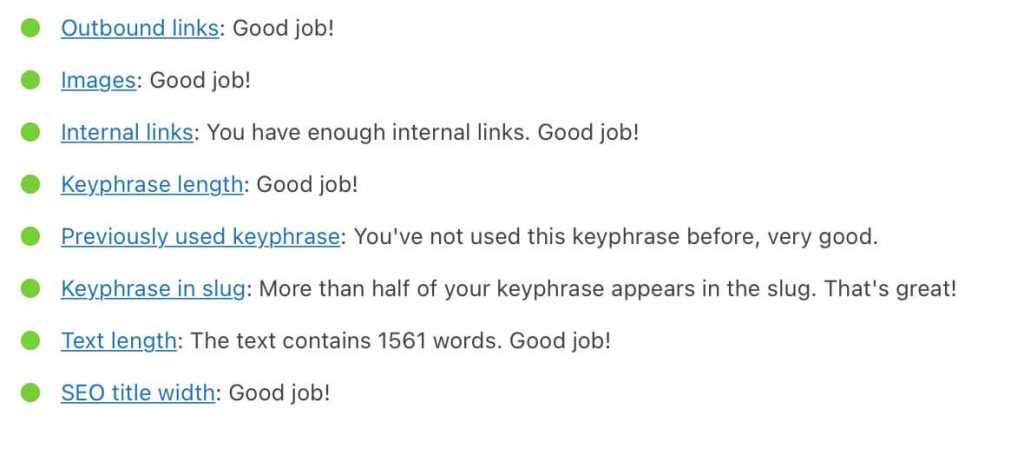Granted, SEO can become technical very quickly and is not an exciting topic for everyone. Doing it consistently and well can be a stretch for many small businesses. But then again, there are many simple ways to bring SEO into your business practices and use it to your advantage.
Let’s dive into some of the things you can do to improve SEO on your WordPress website.
Although search engine optimisation includes easy navigation, continued technical improvements, visuals, structure, and link building- using keywords to attract more traffic to your website is a core SEO function.
This article will show you how to perform SEO on a WordPress website. We’ll discuss how to find relevant keywords and how to easily embed them in WordPress to create more traffic to your website and boost your business.
What’s a good keyword, and where to find it?

Keywords are the terms people use when looking for information on a search engine. Search engines used to crawl websites for meta tags which were keywords to tell Google that you were answering a given question. These days search engines don’t rely on meta tags, instead, they can read through your content and pick up on key signals to understand not only what you are talking about, but also the intent of the communication you have published.
When writing content for the web, we often like to include keywords. These are terms real people are using on the likes of Google. The terms can be sprinkled into your blog post or website copy in a natural way. The goal is to sound helpful, be human and not a robot.
The main keywords are usually divvied up into primary and secondary keywords.
Primary keywords are the words or phrases that will give you a search engine ranking for a given phrase or term. They’re the ones with a high search volume that could bring traffic to your website.
Note: You can only use a primary keyword once. If you have it optimised on more than one page or content, Google may not know which one to rank first.
Secondary keywords provide additional details and information to the reader. They don’t have as much SEO value as primary keywords but use them well throughout your content, and they will support your website’s ranking. Remember to use keywords with the same intent.
For example, for LYF Solutions, keywords center around small business solutions, ethical marketing and sustainable practices on the web.
Together with these keywords, meta descriptions (a brief description of the content, of a web page or a blog, for example) will give a search engine all the clues relating to the content of our web pages. And it’s these keywords, meta titles and descriptions which show up as a search result.

As you can see it is not surprising that we have gone for the term “Green Web Hosting” for our web hosting solution and like to insert our “Ethical Digital Marketing” line to reinforce our key value proposition.
What words are relevant to your business and describe your services or products?
What are the questions your potential customers will want to have answered?
How to select the right keywords
Thousands of people may all look for the same service or product online. However, how they go about that, how long they spend searching for something and what question they type into their search engine will likely vary and is constantly evolving.
To put that into perspective, check out these Google statistics:
- 3.5 billion Google searches are made globally every day.
- Between 16% and 20% of Google searches annually are new — they’ve never been searched before.
- Over 45% of Google users only use one or two words for a search query.
Whether you are using WordPress or a different content management system, your keyword research should be the first step on your SEO journey.
To make those keywords work for you and figure out what to rank for, it’s crucial to understand keyword difficulty. Keyword difficulty lets you determine how competitive a specific term is and whether it is worth your time – and therefore money – to use it.
Keyword research will allow you to identify those popular phrases and keywords potential customers enter into a search engine. It will provide you with data to direct your optimisation effort and give you:
- Data relating to the demand for a specific keyword;
- Suggestions for associated, related keywords;
- How hard it might be to compete for a particular term or phrase in an organic search result.
- Analyse the performance of your online presence, including keyword performance
Most importantly, though, keyword research is a fantastic marketing tool. It can give you the necessary insight into what and why people are searching for a specific product or service.
We understand this can all sound a bit daunting, but some fantastic programmes and WordPress plugins can do most of the heavy lifting for you.
SEMRush, for example, comes with excellent learning resources. You can even give it a go with a free trial.
And don’t forget, you can outsource SEO services! SEO optimisation and analysis, web design, content creation and sustainable marketing strategies are where we can offer professional solutions and services tailored to your needs.
Keywords, SEO and WordPress – Our top tips

Now that you’ve got your keywords and phrases fine-tuned and a strategy in place, let’s look at how to embed them in the globally most popular content management system: WordPress.
At LYF Solutions, we work with Shopify, Squarespace and other platforms. But most of our web design is in WordPress. In fact, almost 40% of all websites worldwide are WordPress sites and over 90% of our clients use this platform.
It’s perhaps timely to note that WordPress is not a miracle tool that will magically do its SEO thing all by itself!
SEO is an evolving, somewhat demanding friend who requires regular time and effort. You won’t get around creating valuable, optimised content, enabling SEO-friendly permalinks, and ensuring your site is free from technical hurdles and issues. But WordPress does take care of your SEO basics to help with ranking.
We recommend Installing an SEO Plug-in for WordPress. Specific plugins handle specific tasks and extend your standard CMS functions. There are several paid and free SEO plugins to choose from. It pays to do some research on the most common ones to ensure the one you choose is the right fit for our needs.
To add such an extension on WordPress, login to the admin panel, go to ‘add new’ plugin, search for the plugin you wish to add and hit ‘install’. You will then need to activate it.
Although a plugin won’t do the SEO work for you, it will definitely make it easier and give you the framework to adhere to best practices.
Our recommendation is Yoast SEO which plays well with many other plugins.
Using an SEO writing assistant is also a highly effective way to create and optimise your content. Again, SEMRush has created an easy to use tool. While writing assistants will help suggest additional keywords and structure your content in a search-engine-friendly way, it’s the value of your content that will push you into the top ranks and ultimately increase traffic volume.
A page peppered with keywords is likely to be hard to digest and not an engaging read; it will not pass muster with search engines either. As a rule of thumb, use your keywords strategically and sparingly, ideally not more than once every 200 words.
Meta descriptions and keywords are HTML meta information. Although they don’t appear on your site at first glance, search engines can use them, making them important parts of the puzzle. Embedding keywords and adding meta descriptions in WordPress depends on the plugin you have chosen but is typically a simple process.
Here are some screenshots to show you how to get these organised.



Spending a bit of time on an engaging description (max 160 words) is a good investment! While meta descriptions may not play as important a role as keywords, a well-written, effective description will ideally lead the reader to click through to your website or content. Therefore, we suggest using a meta description for every web page and post for SEO purposes.
And lastly, the way you structure your content the use of titles and visuals will also impact your ranking! Have a look at our practical online copywriting tips if you want to learn more, make content work for you and find a balance between SEO and authentic content.
Get SEOing!
It makes sense that WordPress is such a popular content management system. It is one of the most user-friendly systems out there. With available plugins, it’s also one of the most SEO-friendly CMS’ available. And that means, it’s the most efficient way to attract traffic to your website through SEO, and ultimately boost your business.
All that said, the SEO world remains a specialist field of expertise. Innovative new technologies and platforms are constantly coming onto the market, and the sheer volume of information and options available can be overwhelming.
Let us be your superpower! We’re not afraid of kryptonite, SEO, web design or a powerful marketing strategy! We thrive on it.
If you’d like to find out how we can assist your business with an awesome online presence, please get in touch.














